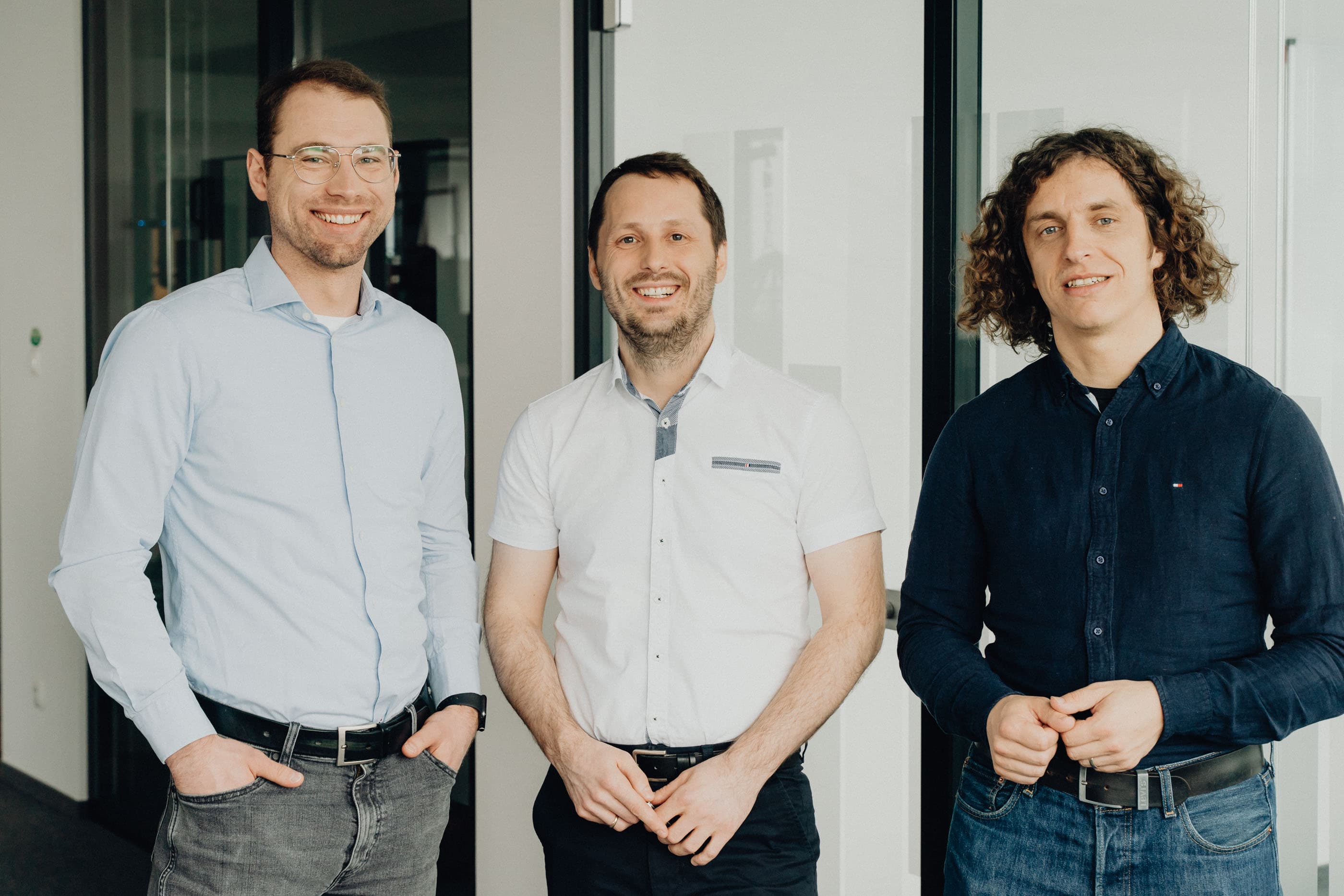Scaling Sustainability: Software Solutions for Growth in the Climate Tech Sector
Alexander Stasiak
Feb 11, 2024・5 min read
Table of Content
Embracing the Climate Tech Revolution
Harnessing Opportunities in Climate Tech
Scaling Your Business With Sustainable Software Solutions
Overcoming Challenges: Compatibility, Tech Selection, and Security
Modernizing with Advanced Technology: AI and No-Code Development
Finding Your Reliable Tech Partner: From Ideation to Large-Scale Applications
Holistic Growth: Technology and Sustainability
Gaining a Competitive Edge Through Sustainability
Enhancing Productivity with Tailored Software Solutions
Embracing Innovation for a Greener Future
FAQs
As climate change takes center stage globally, the rapidly evolving climate tech sector is witnessing significant innovations and trends. From renewable energy solutions and carbon capture technologies to sustainable agriculture practices and green transportation options, the climate tech landscape is diverse and dynamic. In this piece, we will delve into the latest climate tech trends that are revolutionizing sustainability efforts, exploring how businesses can leverage software solutions to propel growth, streamline operations, and enhance environmental impact. Stay tuned to discover how your company can tap into these several climate tech trends and lead the way towards a more sustainable future.
Embracing the Climate Tech Revolution
In recent years, climate tech has transitioned from a niche market to a pivotal movement reshaping our relationship with the environment. Several notable trends have emerged, showcasing the innovation of both startups and established companies. Renewable energy technologies, particularly solar and wind power, are advancing rapidly, providing cleaner and more sustainable alternatives to traditional energy sources. Energy storage solutions play a crucial role in enabling the efficient utilization of renewable energy, ensuring stability in supply and demand. Additionally, the affordability and expanding infrastructure of electric vehicles (EVs) are driving a significant shift towards cleaner transportation options.
In agriculture, precision farming techniques are optimizing resource usage and enhancing crop yields, contributing to sustainable food production. Startups are also making significant strides in carbon capture and utilization, transforming greenhouse gases into valuable products, thereby mitigating their environmental impact. Furthermore, the rise of green buildings, designed for energy efficiency and reduced carbon emissions, presents new opportunities in construction and property management. These trends underscore a robust market for climate tech solutions, offering fertile ground for businesses seeking to innovate and grow sustainably.
Harnessing Opportunities in Climate Tech
The climate tech revolution offers a plethora of opportunities for businesses poised to embrace change. By investing in climate tech, companies not only contribute to a sustainable future but also tap into a rapidly expanding market for green products and services. Forward-thinking businesses leverage government incentives for sustainable practices, which not only drive cost savings but also demonstrate a commitment to environmental stewardship.
Moreover, integrating climate tech into operations allows companies to reduce their carbon footprint, a factor increasingly influencing consumer purchasing decisions. Beyond financial benefits, climate tech ventures often position themselves as leaders in innovation, attracting top talent and investors aligned with companies driven by purpose beyond profit. By embedding sustainability into their business strategies, climate-conscious companies can cultivate brand loyalty, access new markets, and create enduring value.
Now is the opportune moment for businesses to look forward and explore how they can adapt and thrive in the burgeoning climate tech landscape. By embracing sustainability as a guiding principle, companies can not only navigate the challenges of today but also pave the way for a more resilient and prosperous future for generations to come.
Scaling Your Business With Sustainable Software Solutions
Overcoming Challenges: Compatibility, Tech Selection, and Security
Scaling your business with sustainable software solutions can be a rewarding endeavor, but it comes with its fair share of challenges. Here's how to navigate them effectively:
- Compatibility: Ensuring that the new software integrates seamlessly with your existing systems is crucial to avoid disruptions in operations. Conduct thorough compatibility assessments before implementation to identify any potential issues.
- Tech Selection: With numerous options available, choosing the right software can be overwhelming. Focus on solutions that align with your business goals and sustainability objectives. Look for software with a proven track record in similar industries.
- Security: Protecting your data from breaches is non-negotiable. Opt for software solutions with robust security measures in place, and consider additional steps like employee training to mitigate risks. Prioritize security to safeguard your business's sensitive information.
Addressing these challenges involves careful consideration and proactive measures to ensure a smooth transition to sustainable software solutions.
Modernizing with Advanced Technology: AI and No-Code Development
Embracing advanced technologies such as artificial intelligence (AI) and no-code development platforms can revolutionize how your business operates:
- AI: Utilize AI for automation and data-driven insights to optimize various aspects of your operations. From predictive maintenance in manufacturing to personalized customer experiences, AI offers unparalleled capabilities.
- No-Code Development: Democratize technology creation by empowering individuals without technical backgrounds to build applications. This accelerates innovation and reduces dependence on skilled developers, enabling faster solution deployment.
By leveraging AI and no-code development, your business can achieve greater agility and efficiency, driving growth in the sustainability sector.
Finding Your Reliable Tech Partner: From Ideation to Large-Scale Applications
Choosing the right tech partner is essential for successfully scaling your business with sustainable software solutions:
- Expertise: Look for a partner with expertise in the latest technologies and a deep understanding of your growth and sustainability vision.
- Guidance: Select a partner capable of guiding you through the entire development process, from ideation to execution. They should offer support at every stage, ensuring a seamless transition.
- Reliability: Prioritize reliability and track record when choosing a tech partner. They should have a proven ability to build scalable solutions capable of supporting your long-term growth objectives.
Partnering with the right tech firm can make all the difference in achieving your sustainability goals and scaling your business effectively.
Holistic Growth: Technology and Sustainability
Gaining a Competitive Edge Through Sustainability
Sustainability is no longer just a buzzword; it's a competitive differentiator that can set your business apart. By positioning yourself as a sustainability leader, you can attract customers who prioritize environmental responsibility, thereby expanding your market share. Implementing sustainable practices can also lead to cost savings by reducing waste and energy consumption, reducing greenhouse gas emissions, which can translate into lower operating expenses.
Moreover, investors are increasingly directing funds and venture capital towards companies that demonstrate a commitment to sustainability, recognizing the long-term value they create. By showcasing your sustainable initiatives, you can attract this investment and secure the capital needed for growth.
Leveraging technology to enhance sustainability efforts can also streamline your operations, making your business more agile and responsive to changes in the market. Whether it's through efficient resource management, reducing your carbon dioxide and emissions, or promoting a circular economy, embedding sustainability into your business strategy can drive innovation and profitability.
Enhancing Productivity with Tailored Software Solutions
Tailored software solutions are key to enhancing productivity in any business aiming for holistic growth. By adopting software that is customized to the unique needs of your business, you can streamline workflows, reduce manual errors, and ensure that your team is focusing on high-impact activities.
Custom solutions can automate routine tasks, freeing up your team to concentrate on strategic initiatives that drive sustainability and growth climate tech company. They also provide better data analysis capabilities, enabling you to make more informed decisions quickly and efficiently.
When software is tailored to your operations, it integrates more seamlessly with existing processes, which reduces the learning curve and disruption to your business. This bespoke approach ensures that every feature is designed to fulfill a specific purpose, eliminating unnecessary complexity and focusing on functionality that adds value to your business. Investing in tailored software solutions is an investment in your company's productivity and sustainable future.
Embracing Innovation for a Greener Future
Innovation is the cornerstone of achieving a greener future and should be at the heart of any growth strategy. Embracing innovation means more than just adopting new technologies; it's about fostering a culture that challenges the status quo, encourages creative thinking, and seeks out sustainable solutions.
By prioritizing innovation, companies can develop products and services that not only meet the demands of a changing market but also contribute to environmental conservation. This could involve exploring alternative materials, using clean energy, optimizing supply chains for reduced carbon emissions, or creating closed-loop systems that minimize waste.
Innovation also means staying ahead of regulatory changes climate technology and customer expectations by proactively seeking ways to reduce your environmental footprint. Companies that lead in this area can not only expect to reap the benefits of a loyal customer base but also set industry standards that define the future of sustainable business practices.
FAQs
What defines climate tech and why is it important?
Climate tech encompasses a range of technologies aimed at mitigating or adapting to climate change, such as renewable energy, carbon capture, and sustainable agriculture. It's crucial because these technologies offer solutions to reduce global greenhouse gas emissions and transition towards a more sustainable, low-carbon economy, addressing one of the most pressing challenges of our time.
How can renewable energy technologies contribute to climate tech?
Renewable energy technologies like solar and wind power provide clean and sustainable alternatives to fossil fuels, significantly reducing carbon emissions. By harnessing renewable sources of energy, we can decrease our reliance on environmentally harmful energy sources, mitigating climate change and promoting a more sustainable energy future.
What role does energy storage play in climate tech?
Energy storage systems, such as batteries, play a vital role in climate tech by enabling the efficient use of renewable energy sources. They help manage the intermittency of renewables like solar and wind power, ensuring a stable and reliable energy supply even when the sun isn't shining or the wind isn't blowing. This capability is crucial for transitioning to a renewable energy-based grid and reducing dependence on fossil fuels.
How is climate tech transforming the transportation sector?
Climate tech is revolutionizing transportation through the adoption of electric vehicles (EVs) and other green transportation options. EVs significantly reduce emissions compared to traditional combustion engine vehicles, contributing to cleaner air and mitigating climate change. Additionally, advancements in sustainable transportation infrastructure and logistics are further reducing the environmental impact of the transportation sector.
Can precision farming technologies enhance sustainability in agriculture?
Yes, precision farming technologies optimize resource use, minimize waste, and increase crop yields, making agriculture more sustainable and efficient. By leveraging data analytics, sensors, and automation, precision farming enables farmers to make informed decisions about irrigation, fertilization, and pest management, reducing environmental impact while maximizing productivity.
What are the benefits of investing in climate tech for businesses?
Investing in climate tech offers numerous benefits for businesses, including cost savings through energy efficiency, enhanced brand reputation as environmentally responsible entities, access to new markets driven by consumer demand for sustainable products and services, and compliance with increasingly stringent environmental regulations. Additionally, investing in climate tech can future-proof businesses against the risks associated with climate change and resource scarcity.
How do carbon capture and utilization technologies impact climate tech?
Carbon capture and utilization technologies offer a promising approach to reducing greenhouse gas emissions by capturing CO2 from industrial processes or directly from the atmosphere and converting it into valuable products. By turning carbon emissions into useful resources, these technologies help mitigate climate change while creating economic opportunities and promoting sustainable development.
What challenges do companies face when implementing climate tech solutions?
Companies may encounter challenges such as high initial costs, technological compatibility with existing systems, regulatory hurdles, and the need for skilled personnel to manage and maintain new technologies. Overcoming these challenges requires careful planning, strategic investment, and collaboration with stakeholders to navigate the complexities of implementing climate tech solutions effectively.
Why is software development crucial for scaling sustainability in the climate tech sector?
Software development plays a crucial role in scaling sustainability in the climate tech sector by enabling the integration of innovative technologies, enhancing data analysis for better decision-making, and supporting the efficient management of climate tech solutions. Customized software solutions tailored to specific sustainability goals can optimize operations, automate processes, and drive growth in the sector.
How can businesses overcome compatibility issues with sustainable software solutions?
Businesses can overcome compatibility issues by carefully planning integrations, choosing adaptable and interoperable technologies, and partnering with experienced tech providers to ensure seamless implementation. Prioritizing compatibility from the outset and conducting thorough assessments of existing systems can help mitigate risks and ensure a smooth transition to sustainable software solutions.
What advantages do AI and no-code development offer to climate tech companies?
AI and no-code development accelerate innovation, enable rapid prototyping and customization of solutions, and reduce the need for specialized programming skills, making technology more accessible and adaptable. By leveraging AI for data analysis and automation and embracing no-code development platforms, climate tech companies can streamline operations, enhance efficiency, and drive sustainable growth.
What should companies look for in a tech partner for climate tech solutions?
Companies should seek tech partners with expertise in climate tech, a proven track record of successful projects, and a commitment to sustainability, ensuring alignment with their goals and values. A reliable tech partner should offer guidance throughout the development process, from ideation to execution, and possess the capability to build scalable, future-proof solutions that address the unique challenges of the climate tech sector.
How can sustainability give companies a competitive edge in the climate tech sector?
Sustainability can differentiate companies by showcasing their commitment to environmental responsibility, attracting eco-conscious customers and investors, and enabling compliance with green regulations. Embracing sustainability as a core value can foster innovation, drive operational efficiency, and create new opportunities for growth in the rapidly expanding climate tech sector.
Why is tailored software important for productivity in climate tech companies?
Tailored software aligns with specific business processes and sustainability goals, automating tasks, optimizing operations, and enabling more efficient resource use, thus enhancing productivity. Customized software solutions tailored to the unique needs of climate tech companies can streamline workflows, improve collaboration, and empower teams to achieve their sustainability objectives more effectively.
How does embracing innovation contribute to a greener future in climate tech?
Embracing innovation drives the development of new sustainable technologies and practices, challenges existing paradigms, and accelerates the transition towards a greener, more sustainable future. By fostering a culture of innovation and investing in cutting-edge technologies, climate tech companies can pioneer solutions to pressing environmental challenges and lead the way towards a more sustainable world.
What strategies can businesses use to scale with sustainable software solutions?
Strategies for scaling with sustainable software solutions include focusing on interoperability, investing in scalable and secure technologies, and adopting agile development practices to quickly respond to market and environmental changes.
Digital Transformation Strategy for Siemens Finance
Cloud-based platform for Siemens Financial Services in Poland


You may also like...

Embracing Green Tech: How Digital Transformation Can Drive Sustainability
Green tech and digital transformation go hand in hand, helping businesses cut impact, boost efficiency, and drive innovation.
Alexander Stasiak
Mar 24, 2025・15 min read

Embracing the Future: How Digital Transformation is Changing Customer Experience
Digital transformation is redefining how businesses connect with customers through innovation and technology.
Alexander Stasiak
Apr 21, 2025・16 min read

What Is GreenTech? A Guide to Sustainable Technology
GreenTech, or green technology, encompasses sustainable innovations like renewable energy, electric vehicles, and waste management solutions. Focused on reducing carbon emissions and conserving natural resources, GreenTech aims to combat climate change and create a sustainable future.
Alexander Stasiak
Jun 04, 2024・4 min read




